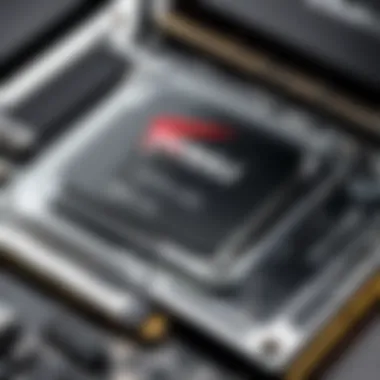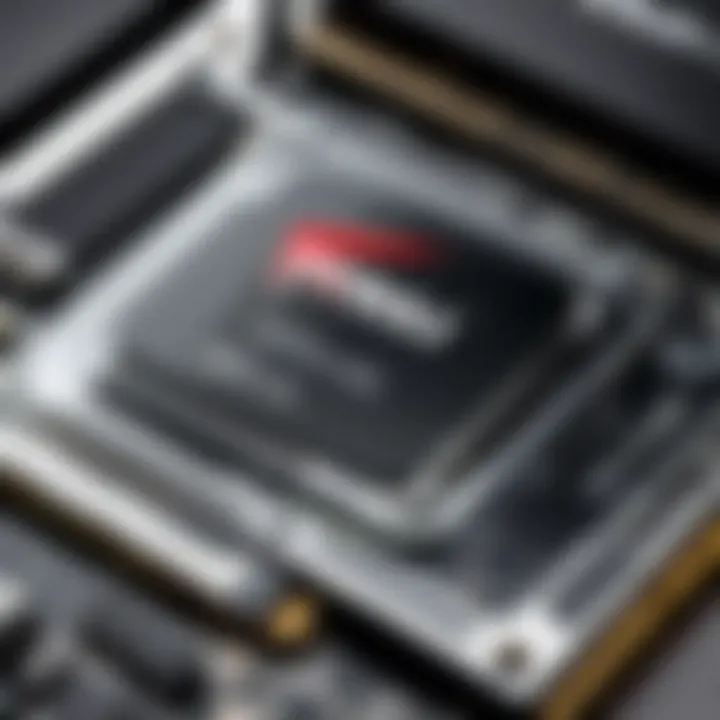Exploring MSI Linux Laptops: Performance and Compatibility


Intro
As the demand for customizable computing solutions grows, the intersection of hardware and operating systems becomes critical. MSI laptops present a compelling option for users who prefer Linux, a powerful operating system favored by developers, tech enthusiasts, and professionals alike. Understanding the key features of MSI laptops, including their design, build quality, and performance under Linux, is essential for making an informed decision. This article aims to shed light on the benefits and challenges of using MSI laptops with Linux, providing valuable insights for both novice and expert users.
Key Features
Design and Build Quality
MSI laptops are known for their sturdy construction and sleek design. The brand often incorporates premium materials that enhance durability without compromising aesthetics. The chassis typically features an aluminum or magnesium alloy body, providing a lightweight yet robust platform for daily tasks.
For Linux users, the ergonomic keyboard design is a highlight. It allows for prolonged typing sessions which can be beneficial for coding or writing. The trackpads on MSI laptops are generally responsive and accurate, accommodating various input preferences.
Display and Performance
The display quality on MSI laptops stands out, with options ranging from FHD to 4K resolutions. Higher end models often include IPS panels, which deliver vibrant colors and wide viewing angles. This is advantageous for users who work with graphic intensive applications or enjoy multimedia content.
When it comes to performance, MSI laptops are equipped with high-end processors and ample RAM, which provide an efficient environment for running Linux distributions. Whether it's Ubuntu, Fedora, or Arch, the laptops manage multitasking with relative ease, providing users with smooth experiences even under heavy loads.
MSI laptops often outperform competitors in terms of cooling solutions, ensuring optimal performance during intense tasks.
Product Specifications
Technical Specifications
- Processors: MSI laptops typically house Intel or AMD processors ranging from mid-tier options to high-end variants, ensuring flexibility for various use cases.
- RAM and Storage: Options usually start at 8GB RAM, with configurations up to 64GB. SSD choices allow for faster boot speeds and improved file access times.
- Graphics Options: Many models feature Nvidia GPUs, enabling robust performance for gaming and graphical applications.
Compatibility and Connectivity
Linux compatibility with MSI laptops is generally favorable. Most recent models support a majority of distributions without significant issues. However, users should meticulously check driver support for hardware configurations, especially for graphics and Wi-Fi components.
Connectivity options are abundant, typically including USB-C, HDMI, and Ethernet ports, which facilitate seamless integration with various peripherals and networks. Bluetooth support is common, providing additional connectivity for accessories.
In summary, MSI laptops and Linux can coexist harmoniously, offering a blend of performance, design, and compatibility that caters to tech-savvy individuals. Whether for work, play, or development, their specifications warrant serious consideration for anyone contemplating a Linux-based laptop.
Preface to MSI Laptops
MSI laptops have emerged as significant players in the competitive landscape of portable computing devices. Their reputation stems from a focus on performance, gaming capabilities, and versatility. This article investigates how MSI laptops stand out, especially when integrated with Linux operating systems. Understanding the brand's positioning and offerings is fundamental before delving into technical discussions.
Brand Overview
MSI, short for Micro-Star International, began its journey in 1986. Originally, it specialized in motherboards and has since expanded into a wide range of products including graphics cards, desktops, and laptops. Its laptops are especially notable for catering to gamers and creative professionals, featuring powerful hardware configurations. The brand has developed a loyal following, particularly among users who demand high performance and reliability. MSI laptops showcase an intersection of advanced specifications with innovative design, tailored for various usage scenarios.
Market Position
In the current market, MSI holds a robust position, competing directly with other brands like ASUS, Dell, and HP. The company's strategy has focused on blending cutting-edge technology with user-centric features. As a result, MSI is seen as a strong contender in the gaming and performance-oriented laptop segments. In recent years, the embrace of Linux by their user base has bolstered its appeal, particularly among tech enthusiasts who appreciate open-source solutions.
"MSI laptops are designed not only to meet the high standards of gamers but also cater to those who wish to utilize powerful tools in a Linux environment."
This dual appeal allows MSI to capture a diverse demographic. The growing recognition of Linux operating systems, combined with MSI's hardware capabilities, creates a unique selling point. Potential buyers can feel assured of quality and performance when choosing an MSI laptop, especially with support for Linux distributions.
Understanding Linux Operating Systems
Linux operating systems are a vital aspect when discussing MSI laptops specifically designed for this environment. Grasping how Linux works and its distinct features can greatly impact the overall experience users have while engaging with MSI devices. Linux is recognized for its open-source nature, offering users a flexible platform that can be tailored to various needs. This discussion will illuminate both the significance of understanding Linux and the specific distributions that work well with MSI laptops.
What is Linux?
Linux is an operating system that was first created by Linus Torvalds in 1991. It is built on the principles of Unix, but it is free to use and modify. Unlike proprietary systems such as Microsoft Windows or macOS, Linux allows anyone to view, change, and distribute its source code. This openness fosters a community of developers and users that contributes to a robust and diverse ecosystem.
The Linux kernel, which is the core component, manages system resources and allows applications to interact with the hardware. Several variations, known as distributions or distros, of Linux exist. They range in purpose from general use to specialized applications. Due to this diversity, users can find a version of Linux that perfectly aligns with their requirements. Understanding these nuances will help users get the most from their MSI laptops.
Popular Linux Distributions
There are numerous Linux distributions available today, each offering unique features. Some of the most popular include:
- Ubuntu: Known for its user-friendly interface, Ubuntu is ideal for beginners and general users. It offers extensive community support and regular updates.
- Debian: Valued for its stability and performance, Debian serves as the foundation for many other distributions, including Ubuntu.
- Fedora: This distribution is recognized for its cutting-edge technologies and features, appealing to developers and tech enthusiasts.
- Arch Linux: Aimed at advanced users, Arch Linux offers more customization options and a rolling release model, ensuring the latest software.
- Mint: Based on Ubuntu, Mint provides a familiar desktop experience that many users prefer.
Each of these distributions excels in specific areas and has various desktop environments, which can influence performance on MSI laptops. Users should consider their own needs and technical expertise when selecting a Linux distribution.
"Understanding Linux and its distributions can dramatically improve the experience of using MSI laptops, allowing for better customization and performance."
Benefits of Using Linux on MSI Laptops
Choosing to run Linux on MSI laptops presents a range of benefits, each contributing to a superior computing experience. This decision not only enhances the laptop's performance but also brings forth a multitude of security features and customization options. Understanding these advantages can aid users in making an informed choice that aligns with their personal and professional needs. In this section, we delve into the specific elements that highlight the benefits of using Linux on MSI laptops, focusing on performance, security, and customization.
Enhanced Performance
Linux operating systems are known for their efficient resource usage. MSI laptops, equipped with robust hardware, make an excellent pairing with Linux. The lightweight nature of many Linux distributions can lead to faster boot times and snappier application launches compared to traditional operating systems like Windows.


Specifically, when one runs Linux on MSI laptops, users often report:
- Optimized CPU Usage: Linux takes advantage of the multi-core processors present in MSI devices, efficiently distributing tasks across cores.
- Reduced Memory Load: Linux can run smoothly on lower RAM compared to other operating systems, especially with distributions like Ubuntu or Fedora.
- Longer Battery Life: Energy management in Linux can be superior, resulting in longer usage times, a crucial factor for mobile users.
These enhanced performance metrics make Linux a compelling choice for those who seek to maximize the capabilities of their MSI devices.
Security Features
The security model of Linux is inherently different from that of proprietary operating systems. MSI laptops, when paired with Linux, benefit from numerous built-in security features that appeal to both casual users and security-conscious individuals.
Some notable security benefits include:
- User Privilege Management: Linux implements a robust permissions system that prevents unauthorized access to files and resources.
- Regular Updates: Most Linux distributions roll out regular security updates, ensuring users stay protected against vulnerabilities.
- Open Source Nature: The open-source model allows for transparency, permitting users to inspect and modify code, reducing the likelihood of backdoor exploits.
These features contribute to making Linux a secure environment for both personal and professional computing tasks.
Customization Options
One of the most appealing aspects of Linux is its high level of customization. Users of MSI laptops can tailor their Linux experience to fit their needs perfectly. This flexibility can manifest in various ways:
- Choice of Distributions: With numerous distributions available, users can select one that aligns with their hardware specifications and personal preferences.
- Desktop Environments: Users can choose from multiple desktop environments like GNOME or KDE, altering the look and feel of the operating system according to their taste.
- Software Configurations: Linux allows for extensive modification of system and application settings, enabling users to create an environment that enhances productivity.
In essence, the ability to customize enhances usability, catering to unique workflows that users may require.
Key Hardware Specifications
The significance of hardware specifications in MSI laptops tailored for Linux cannot be overstated. These specifications greatly influence the performance and user experience, addressing essential facets like processing power, memory capacity, and graphics capabilities. Understanding these variables helps prospective buyers evaluate which model fits their Linux needs best. Better hardware translates to enhanced multitasking, faster processing speeds, and improved overall functionality.
Processor Choices
The variety of processor options available in MSI laptops directly impacts their efficiency on Linux systems. MSI often incorporates Intel Core i7 and AMD Ryzen processors across their lineup. These processors deliver admirable speed and responsiveness. Linux users tend to favor these options due to their performance in handling complex tasks, such as programming or graphic design.
- Intel Core i7: Known for good multi-threading performance.
- AMD Ryzen: Recognized for impressive parallel processing capabilities.
Compatibility with Linux distributions is generally strong for both processor types, ensuring a smoother operation.
RAM and Storage
RAM and storage play critical roles in the performance of Linux on MSI laptops. Higher RAM sizes benefit users doing multitasking. With more RAM, the operating system can manage more applications simultaneously. Typically, MSI laptops come with 8GB, 16GB, or even 32GB options. The trend in today’s tech landscape favors a minimum of 16GB for demanding tasks.
When it comes to storage, MSI laptops often feature SSDs, offering faster read and write speeds compared to traditional HDDs. This is particularly advantageous for Linux, as it enhances boot times and application loading.
- SSD vs. HDD:
- SSD: Faster, more reliable.
- HDD: Larger capacity but slower.
Graphics Capabilities
Graphics capabilities are another pillar of hardware specifications. MSI provides laptops with NVIDIA GeForce and AMD Radeon graphics cards. The choice of graphics card can determine how well the laptop performs in graphically intensive tasks.
- NVIDIA: Known for robust performance and compatibility with popular Linux drivers.
- AMD: Offers favorable solutions but may have varying support depending on the specific model.
For professionals and enthusiasts engaged in gaming or graphic design, the right graphics solution ensures a more fluid performance and better visual output.
"Choosing the right MSI laptop equipped with optimal hardware specifications is crucial for maximizing the Linux experience."
Compatibility Considerations
When discussing MSI laptops in the context of Linux operating systems, compatibility becomes a vital focus. Users must ensure that both the hardware and software aspects of the laptop align with the Linux distribution they intend to use. This consideration impacts the overall experience and effectiveness of the laptop.
Driver Support
Driver support is one of the most critical factors in ensuring smooth functionality when utilizing Linux on MSI laptops. Drivers act as the bridge between the operating system and hardware components, such as the graphics card, sound devices, and networking interfaces. Incompatible or missing drivers can lead to performance bottlenecks or even hardware malfunctions.
MSI laptops generally use components from well-known manufacturers like Intel and NVIDIA. These companies often provide up-to-date drivers for Linux, reducing potential issues significantly. In many cases, the kernel's support for these devices is robust, allowing users to install lightweight distributions without heavy customization.
However, some peripherals might not receive immediate driver support. Proprietary drivers, which are common in gaming laptops featuring powerful graphics cards, might require additional steps for installation. Users often turn to forums or community resources to find the best solutions. Checking compatibility lists from both MSI and the specific Linux distribution can save time and effort.
"The seamless integration of drivers is paramount for a hassle-free Linux experience on MSI laptops."
Hardware Limitations
Hardware limitations can restrict the overall user experience on MSI laptops running Linux. The primary concern is ensuring that the laptop's specifications meet the minimum requirements of the chosen distribution. While many MSI laptops are equipped with capable hardware, variations in models can influence performance outcomes.
For example, running resource-intensive applications on low-end configurations may result in sluggish performance, regardless of the operating system. Enthusiasts commonly recommend keeping resource usage in check, especially with Linux distributions that feature a heavy desktop environment. Using lighter alternatives can vastly improve the experience.
Additionally, integrated hardware features, such as fingerprint readers or specialized keyboard functions, may not work seamlessly with all Linux distributions. Researching these specific features ahead of time can prevent frustration after the installation is complete.
In incidents where hardware does not operate as intended, users might have to look towards community-driven driver solutions or alternative software that can offer similar functionality.


Ultimately, understanding the compatibility matrix, both from a hardware and software perspective, leads to a more satisfying experience for the user.
Performance Analysis of MSI Laptops Running Linux
Analyzing the performance of MSI laptops running Linux is critical for making informed decisions about hardware and software combinations. Understanding this relationship helps users to maximize the efficiency of their machines. Factors like boot speed, application responsiveness, and overall system stability are crucial to the user experience. In this section, we will explore the benchmarking tools used for analysis and discuss real-world usage scenarios that reveal the capabilities of MSI laptops on Linux.
Benchmarking Tools
Benchmarking tools provide quantitative metrics allowing users to compare the performance of different systems. For MSI laptops operating on Linux, here are some widely used tools:
- Phoronix Test Suite: This is an extensive test suite specifically designed for Linux. It covers various aspects of system performance, including CPU, GPU, and storage analysis. The suite allows for repeating tests, which can be valuable for long-term assessments.
- Geekbench: A cross-platform benchmarking tool that evaluates performance based on real-world tasks. Geekbench results can help in assessing multi-core processing efficiency.
- Sysbench: This tool can evaluate system parameters such as CPU performance, memory speed, and I/O operations. It is highly configurable and can produce detailed reports.
Using these tools equips users with concrete data to understand how MSI laptops perform under Linux environments.
Real-World Usage Scenarios
In practical contexts, the performance of MSI laptops running Linux can vary widely based on user needs. Here are some scenarios to illustrate:
- Software Development: Developers often run various applications simultaneously, such as IDEs, compilers, and virtual machines. Many developers report that MSI laptops with Linux exhibit smooth multitasking capabilities. This is partly due to the efficient resource management provided by Linux distributions.
- Gaming: Gaming on Linux has grown significantly. MSI laptops equipped with powerful GPUs demonstrate solid performance in running native Linux games and Windows games through compatibility layers like Proton. Users have noted good frame rates and stable gaming sessions in titles such as "Counter-Strike: Global Offensive" and "Dota 2."
- Data Analysis: For tasks such as data processing and machine learning, MSI laptops have shown effectiveness, especially when equipped with adequate RAM and storage solutions. Users can utilize frameworks like TensorFlow or PyTorch with ease, exploiting the hardware capabilities of MSI machines.
The performance of an MSI laptop running Linux is determined not only by its specifications but also by the choice of Linux distribution and software deployment.
In summary, the performance analysis of MSI laptops running Linux unveils a robust capability for diverse usage. With the right benchmarking tools and by understanding real-world applications, users can significantly enhance their computing experience.
User Experiences and Reviews
Understanding user experiences and reviews is vital in assessing the value of MSI laptops equipped with Linux. These perspectives not only highlight the performance and usability of devices, but they also shed light on problems or challenges users might face. For tech-savvy individuals and early adopters, knowing real-world interactions can greatly influence their purchasing decision.
User reviews can provide insights into satisfaction levels, performance in various scenarios, and even the compatibility with different Linux distributions. This section delves into both positive feedback and common complaints to present a balanced view of the user experience. It's essential for prospective buyers to consider both sides when evaluating their options.
Positive Feedback
Many users have lauded MSI laptops for running Linux smoothly. Common themes in positive feedback include reliability, speed, and support for graphics-intensive tasks. Users often appreciate the powerful hardware configurations that MSI offers, which pair well with Linux's efficiency.
- Performance: Users frequently report that MSI laptops handle intensive applications without noticeable lag. This is particularly true for creative tasks, such as video editing or graphical design.
- Build Quality: The robust design is often praised. Users feel that they have a durable product that can withstand regular use.
- Gaming Capabilities: For many gamers using Linux, MSI laptops often exceed expectations with graphics performance, especially with recent distributions like Pop!_OS and Ubuntu.
- Positive Community Support: The Linux community is known for its helpfulness. Many users mention that forums and resources provide support for issues encountered specifically with MSI laptops.
Overall, the positive reviews provide a strong endorsement but highlight the advantages of choosing MSI for Linux environments.
Common Complaints
Despite the favorable feedback, not all experiences are ideal. Users have reported various issues that they believe merit attention. A thorough understanding of these complaints is crucial for potential buyers.
- Driver Issues: Some users express frustration with driver support, especially for newer hardware. This can lead to difficulties in fully utilizing the laptop's capabilities.
- Pre-Installed Software: A few users have noted that pre-installed software can be limiting or unnecessary, hindering performance.
- Battery Life: Certain models receive criticism for not meeting expectations regarding battery longevity when running Linux. Users often compare this to the performance seen in Windows.
- Limited Official Support: Some reviewers mention that official support for Linux from MSI is less comprehensive compared to Windows, which can add to the complexity of troubleshooting.
Recognizing these challenges provides a more complete picture for anyone considering an MSI laptop running Linux.
Understanding both positive feedback and common complaints offers valuable insights for prospective buyers. Users should carefully weigh all factors when making a decision.
Troubleshooting MSI Linux Laptops
Troubleshooting is a critical component when working with MSI laptops running Linux. As Linux continues to be a preferred operating system for many users, including developers and tech enthusiasts, understanding how to efficiently resolve common issues is essential. Troubleshooting can enhance user experience and performance, making it easier to utilize the laptop for various tasks. Furthermore, it highlights the importance of adapting technology to meet individual needs.
Common Issues
Despite their remarkable capabilities, users of MSI laptops on Linux may encounter several challenges. Some of the most common issues include:
- Driver Incompatibilities: Certain hardware may not have readily available drivers for Linux, leading to performance hiccups. For instance, specific graphics cards or network adapters might need additional configuration or alternative drivers.
- Hardware Detection Problems: Sometimes, the operating system may fail to recognize hardware components, such as touchpads, webcams, or sound cards. This can stem from lack of support or misconfigurations.
- Power Management Issues: Linux might not always handle power management optimally on MSI laptops. Users may notice rapid battery drain or overheating, which can hinder productivity.
- Software Compatibility: Not all software applications are available or work seamlessly with Linux. This can limit functionality, especially for users transitioning from Windows.
Solutions and Workarounds
Addressing these common issues often requires a combination of official resources, community support, and personal initiative. Here are some effective solutions and workarounds:
- Update Drivers: Regularly check for updates from the MSI website or Linux community forums. Utilizing open-source drivers can often resolve compatibility problems.
- Install Additional Packages: Some functionalities may require specific packages. Tools like can help manage drivers effectively on Ubuntu-based distributions.
- Adjust Kernel Parameters: Sometimes tweaking kernel parameters can enhance hardware detection. This may include editing configuration files located in to add specific boot parameters.
- Explore Community Forums: Platforms such as reddit.com offer extensive discussions and solutions from other users who faced similar issues.
- Check for BIOS Updates: Occasionally, a BIOS update can solve uncommon hardware recognition problems. MSI periodically releases updates that enhance compatibility with Linux.
"Troubleshooting can be empowering; equipping users with knowledge leads to a more satisfying technology experience."
By understanding common issues and exploring practical solutions, users can optimize their MSI laptops while running Linux. This proactive approach fosters a more efficient and enjoyable user experience.
Tips for Optimizing MSI Laptops on Linux
Optimizing MSI laptops for Linux is crucial for enhancing overall performance, stability, and user satisfaction. With the ever-growing user base of Linux, ensuring that the laptops can function seamlessly in this rich environment becomes indispensable. Proper optimization helps in maximizing the hardware capabilities of MSI laptops, enabling them to run applications efficiently while maintaining acceptable power consumption levels. Moreover, such adjustments can mitigate common issues like slow boot times and application crashes, providing a smoother user experience. This section will detail vital strategies for optimizing your MSI laptop’s performance while using Linux.
System Configuration
The system settings play a fundamental role in the performance of MSI laptops when running Linux. One of the first steps to take is to ensure the BIOS settings are correctly configured. Enabling performance modes, adjusting fan profiles, and disabling unnecessary peripherals can make a considerable difference.
Key configuration points include:


- Boot order adjustments: Ensure your preferred boot drive is prioritized for quicker startup.
- Fast Boot option: Enable this to decrease the boot time significantly.
- RAM allocation: Customizing your swap space based on your usage helps in managing memory effectively.
Furthermore, fine-tuning the Linux kernel settings is vital. This can involve tweaking the scheduler and filesystem settings to better suit your workload. Applying these settings often results in substantial performance improvements. Users experienced in command line can do this by editing files such as to adjust kernel parameters.
It's also recommended to stay updated with the latest Linux kernels and distributions. Newer versions tend to include enhancements and fixes relevant to hardware compatibility which can optimize the performance further. Indeed, users should regularly check for updates on forums or the official websites of their Linux distribution.
Software Recommendations
The choice of software can significantly influence the effectiveness of an MSI laptop running Linux. Pre-installed software may not always align with a user's needs. Choosing lightweight applications can positively impact performance. Opting for software alternatives that consume fewer resources can provide an agile working environment.
Recommendations include:
- For text editing, consider using Sublime Text or Vim for their efficiency and lightweight nature.
- Use GIMP instead of Adobe Photoshop for image editing, which is resource-intensive.
- Instead of traditional browsers, using Brave or Midori can enhance browsing speed without excessive resource usage.
Running system tools, like htop, provides real-time insights into resource usage. This tool helps to identify services consuming excessive amounts of CPU or memory, enabling targeted optimizations.
Comparative Analysis
The comparative analysis of MSI laptops and those from other brands serves an important role in understanding the overall market dynamics and the suitability of these devices for Linux operating systems. This section delves into key aspects such as brand reputation, feature differences, performance benchmarks, and user experiences. The insights gained from comparison can help prospective buyers make informed decisions based on their specific requirements.
MSI vs Other Brands
When evaluating MSI laptops against competitors like Dell, HP, Lenovo, and Asus, several distinct differences arise. MSI has carved a niche primarily in gaming and high-performance machines, while others may focus on business or everyday use.
- Build Quality: MSI laptops generally exhibit a sturdy construction, often incorporating premium materials. On the other hand, some competitors might prioritize lightweight designs, potentially sacrificing durability.
- Gaming Capabilities: MSI laptops are predominantly designed with powerful graphics cards such as the NVIDIA GeForce series. This gives them an advantage in gaming and graphic-intensive applications. In contrast, brands like Dell's XPS series may cater more to productivity software.
- Cooling Systems: A significant feature in MSI devices is their advanced thermal solution. Many users find MSI laptops manage heat better under load. Other brands may use basic cooling systems that don't perform as effectively in intensive scenarios.
- Price-to-Performance Ratio: MSI often provides higher specifications for the same price point compared to brands like HP and Lenovo. This aspect can be particularly enticing for users seeking performance without breaking the bank.
Linux Performance on Different Brands
The performance of Linux on various laptop brands can vary widely and understanding these differences is crucial for users contemplating Linux installation.
- MSI: MSI laptops are often praised for their out-of-the-box support for Linux distributions. Many early adopters have found great success installing Ubuntu, Fedora, and Arch on these machines with minimal issues.
- Dell: Models like Dell's XPS series have gained traction in the Linux community owing to their well-documented compatibility. However, some users report challenges with certain drivers, especially in graphics.
- HP: While HP has produced a few models certified for Linux, general compatibility can be hit or miss. Users often need to troubleshoot to make specific hardware work.
- Lenovo: Lenovo laptops have a mixed reputation. ThinkPad series machines tend to perform well with Linux due to excellent driver support but other series might create compatibility headaches.
In summary, each brand presents unique strengths and weaknesses for Linux users. Ultimately, the decision should factor in the specific laptop model, user requirements, and intended software usage to achieve optimal performance.
"Choosing the right laptop for Linux requires a thorough understanding of compatibility and performance across different brands."
Each user’s experience will shape their perspective, thus a careful evaluation is essential.
Future Trends for MSI Laptops and Linux
The landscape of computing is constantly evolving. The intersection of MSI laptops and Linux operating systems reveals significant future trends that could reshape user experiences. Understanding these trends is crucial for consumers and professionals aiming to stay ahead in the technology curve. The trajectory of market dynamics, fueled by customer preferences and technological developments, highlights the relevance of exploring future pathways.
Market Expansion
As the adoption of Linux grows among various user groups, the market for MSI laptops tailored for Linux is expanding. Companies are recognizing the demand for reliable devices that can run Linux with efficiency. MSI's commitment to enhancing Linux compatibility signifies its intention to tap into this burgeoning user base. By designing laptops specifically optimized for Linux, MSI could better position itself as a leader in this niche market.
The growth in service sectors such as software development, education, and research heavily influences this market. Users within these fields often prefer Linux due to its open-source nature, security features, and robust performance. Companies like MSI are increasingly likely to create laptops with specifications that cater directly to these segments. Higher RAM options, powerful processors, and premium graphics capabilities will likely be decisive factors.
"The demand for Linux compatibility in laptops is not a passing trend; it indicates a fundamental shift in user needs and preferences."
This demand for better hardware support also parallels the increasing interest in multi-tasking capabilities. Users look for devices that can seamlessly run several applications without lag. MSI, with its innovative engineering, has the opportunity to provide solutions that meet this need.
Furthermore, consumers are becoming more aware of alternative operating systems. As awareness increases, it drives diversification in hardware offerings. MSI’s existing high-performance models can be reimagined for Linux, fostering a wider choice of options. The expansion into the Linux laptop market not only helps attract dedicated users but also nurtures a community that values customization and performance.
Emerging Technologies
The progression of technology plays a central role in shaping the future of MSI laptops with Linux. Artificial intelligence, machine learning, and cloud computing are reshaping how software interacts with hardware. These emerging technologies have the potential to optimize how MSI laptops perform with Linux.
For instance, AI-driven tools can aid in system resource management, ensuring that CPU and RAM are allocated efficiently based on user tasks. This is particularly vital for users who rely on computationally heavy applications or need real-time processing capabilities. MSI can leverage these technologies to enhance their product offerings, ensuring that the laptops provide a more fluid experience for Linux users.
Another critical aspect is the advancement in hardware, specifically in chip design. The push towards more energy-efficient processors means that future MSI laptops could offer extended battery life while maintaining high performance. This is a compelling selling point in a market increasingly concerned with sustainability and efficiency.
Innovation in display technology is also noteworthy. With a rising focus on immersive experiences, MSI may incorporate higher-resolution screens that are optimized for Linux environments. Display features such as anti-glare surfaces and enhanced color accuracy could cater to creatives who work extensively on graphic design or video editing applications in Linux.
Ultimately, the integration of these emerging technologies will not only enhance user experiences but will also solidify MSI��’s reputation as a forward-thinking manufacturer dedicated to meeting the evolving needs of the Linux community.
Final Thoughts
The concluding section of this article compiles the essential insights about MSI laptops running Linux. Recognizing the relevance of this topic is crucial. As the Linux operating system gains popularity, understanding how MSI laptops integrate with it becomes ever more significant for both tech enthusiasts and casual users.
Linux provides a variety of tools and environments that can be efficiently harnessed by MSI hardware. The intersection of these two powerful realms opens new avenues for productivity and creativity. A strong point from our discussions is the compatibility of the hardware with Linux distributions. Here, MSI’s commitment to ensuring high-quality components makes these laptops an excellent choice for users seeking a reliable performance.
Moreover, performance enhancements in Linux environments on MSI laptops cannot be overlooked. This article highlights features that optimize their capabilities, offering a distinctive edge over other competitors in the market. By addressing common issues faced by users and providing practical solutions, we have aimed to equip readers with the knowledge necessary to navigate potential challenges.
In summary, it is evident that the synergy between MSI laptops and Linux presents a compelling option for those aiming for a robust computing experience. The detailed insights here underline the opportunity for both prospective buyers and current users to better appreciate and utilize their devices.
Summary of Key Points
- MSI Laptops as a Choice for Linux: MSI laptops offer extensive compatibility with various Linux distributions, ensuring that users have a seamless experience.
- Performance Benefits: Many users report enhanced performance when transitioning from other operating systems to Linux, benefiting from the lightweight nature of certain distributions.
- Hardware Specifications: Significant focus has been placed on hardware configurations that complement Linux functionalities, particularly in terms of processor and RAM.
- User Experiences: Evaluating user feedback helps in understanding both strengths and weaknesses in running Linux on MSI devices.
- Troubleshooting and Support: The article discusses common issues and recommends solutions, demonstrating the support structure available for users.
Recommendations for Prospective Buyers
When considering MSI laptops for Linux, take into account the following recommendations:
- Research Specific Models: Before making a purchase, research specific MSI models known for their Linux compatibility. Look for feedback from other Linux users.
- Consider Your Use Case: Define your needs such as gaming, programming, or general use. Some MSI laptops may be better suited for certain applications.
- Evaluate Performance Metrics: Be sure to look at performance benchmarks available online for the specific model that piques your interest.
- Software Ecosystem: Familiarize yourself with the software available for your chosen Linux distribution. Some may not support specific hardware features out of the box.
- Check for Community Support: Look for active forums or communities, such as those on Reddit, where MSI Linux users congregate to share advice and experiences.



